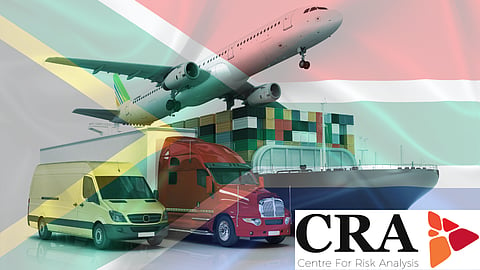South Africa’s transport woes: CRA Macro Review reveals a struggling economy stuck in a traffic jam
In the latest Macro Review by the Centre for Risk Analysis, the dire state of South Africa's transport sector takes centre stage. With minibus taxis dominating public transit and train services plummeting by 97%, commuters face chaos and danger. Freight rail infrastructure decline, port inefficiencies, and escalating fuel costs further cripple the economy. Calls for devolution intensify, but progress is slow. As South Africa grapples with transport challenges, the article underscores the urgent need for comprehensive solutions to revive the economy's prospects.
Sign up for your early morning brew of the BizNews Insider to keep you up to speed with the content that matters. The newsletter will land in your inbox at 5:30am weekdays. Register here.
LEADER – CRA Macro Review: SA's Transport Blues
By Makone Maja: Centre For Risk Analysis
This edition of the Macro Review from the Centre For Risk Analysis (CRA) provides an overview of the transport sector as a critical part of the South African economy.
When it comes to mass transit, South Africans rely far more on minibus taxis than on other forms of public transportation. In 2022, some 82% of monthly public transport trips to and from work were by minibus taxi, compared to 14% made by bus and just 4% by train. Not surprisingly, commuters bear the brunt of any disruptions in the taxi industry. A case in point is the August showdown between the South African National Taxi Council (SANTACO) and Cape Town authorities. This led to widespread violence and ultimately, the loss of five road users' lives.
Despite the general lawlessness in the taxi industry, commuters have even less confidence in commuting by train. The number of passenger rail journeys crashed by 97% between 2008 and 2022, owing to ailing infrastructure and ageing rolling stock. Rail maintenance, which requires external sourcing of parts for repairs, is also increasingly neglected. This has led to incessant delays and cancellations, making trains inoperable, uncompetitive, inefficient, and generally unattractive for commuters.
Freight rail infrastructure — a critical cog in the movement of goods, notably the export of commodities — has also been in steep decline. State logistics company Transnet, which transported 226 million tonnes of goods by train in 2017, could only manage 154 million tonnes by 2022. Owing to Transnet's incapacity, many businesses have therefore turned to road freight, resulting in a road-to-rail ratio of 8:1 by tonnage, and added costs. Frequent strikes, cable and fuel theft, and an ageing fleet of locomotives are among the major contributors to Transnet's slackening operations. For instance, copper cable theft alone led to the loss of 1 500 kilometres of cable in 2021/22 – that is roughly the distance between Pretoria and Cape Town.
*Contact the Centre For Risk Analysis (CRA) for the full detailed Macro Review
P O Box 291722, Melville, Johannesburg, 2109, South Africa
Telephone: (011) 482–7221
E-mail: sherwin@cra-sa.com www.cra-sa.com
A significant determinant in the shipping value chain — port dwell times — can be a source of disruption, delays, and increased costs of imports and exports. The average global export dwell time in Q2 2023 was 4.4 days, while South Africa's dwell times ranged between 5 and 8 days. Reining in these figures is key to improving South Africa's Container Ports Performance Index ranking, which in 2022 placed Durban 341st, and Cape Town 344th, out of a total of 348 ports assessed worldwide.
Port and railway inefficiencies, a major sign of the state's overall foundering, have spurred calls for devolution from diverse quarters, including the Cape Town metro and the Competition Commission. Devolution is key to improved service delivery by moving decision making and accountability for performance closer to the point of delivery. In May 2022, the Cabinet passed the White Paper on National Rail Policy, which commits to devolving the rail network to capable metros, and to producing a Rail Devolution Strategy in 2023. However, the Mayor of Cape Town, Geordin Hill-Lewis, has said that the process of forming a joint working committee on devolution between the metro and national government is beset by numerous delays and advancing at a snail's pace.
In addition to crumbling infrastructure, commuters and the transport sector are facing escalating costs. According to the Central Energy Fund, 80% of the rise in fuel prices in general, and 86% of diesel price increases in particular, are due to crude oil price fluctuations. Fuel price surges are exacerbated by a weak Rand, as internationally, crude oil is priced in Dollars. Further increments are a result of domestic fuel levies, which account for around a quarter of the fuel price at the pump. The two largest levies are the general fuel levy, which has increased by 225% since 2008, and the Road Accident Fund levy, up by 425%. The general fuel levy contributes over 5% of all tax revenues collected by the government and is not ringfenced for spending that benefits road users.
'Small remains the hole that is dug without fuel'. Equally, small remains the economy that cannot move people and goods cost effectively and safely. South Africa needs, therefore, to return to the basics, and fix all transport-related elements that cost the economy billions. Otherwise, economic growth prospects remain subdued.
Read also:

